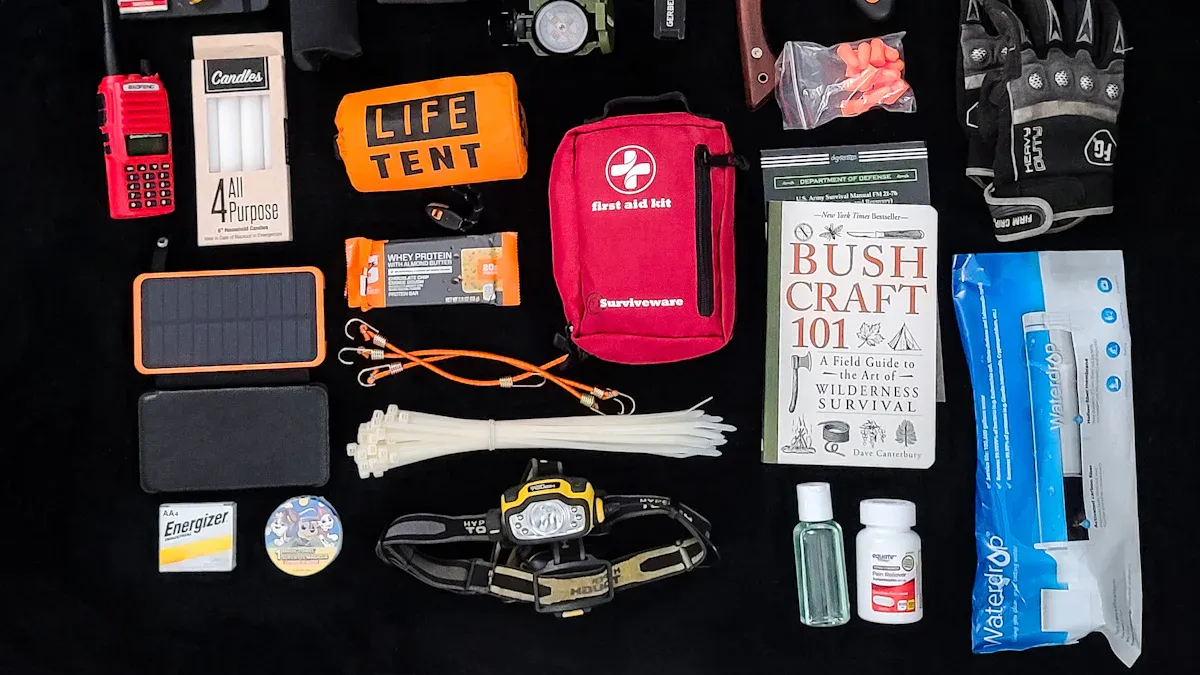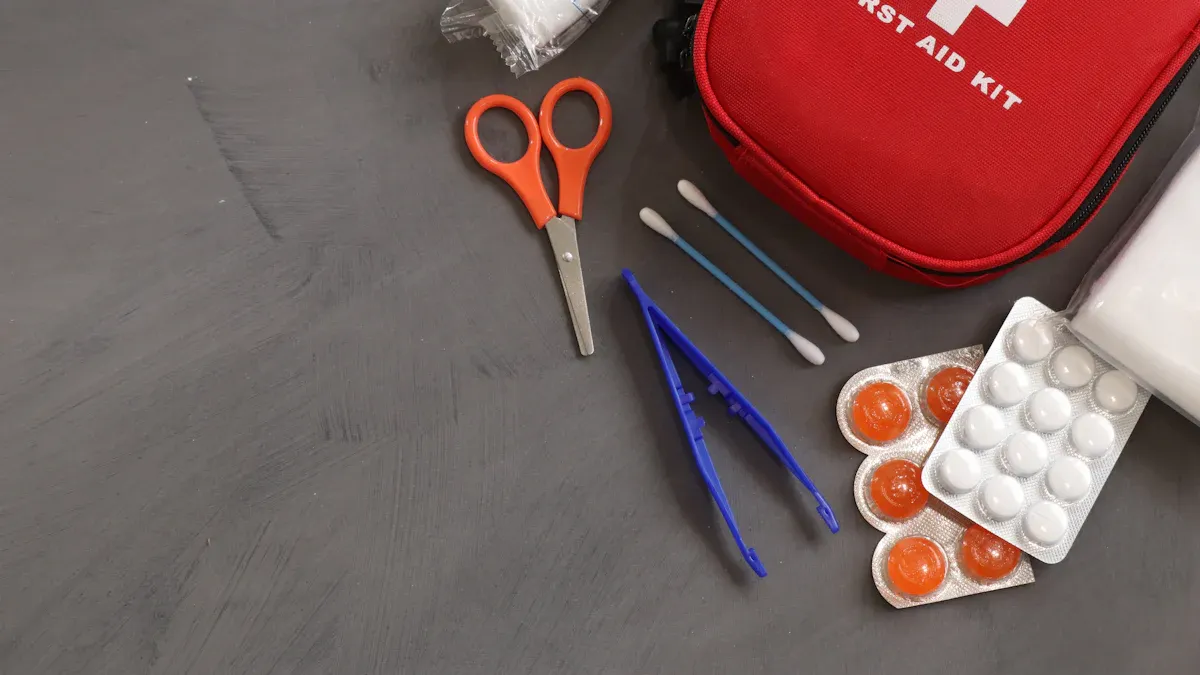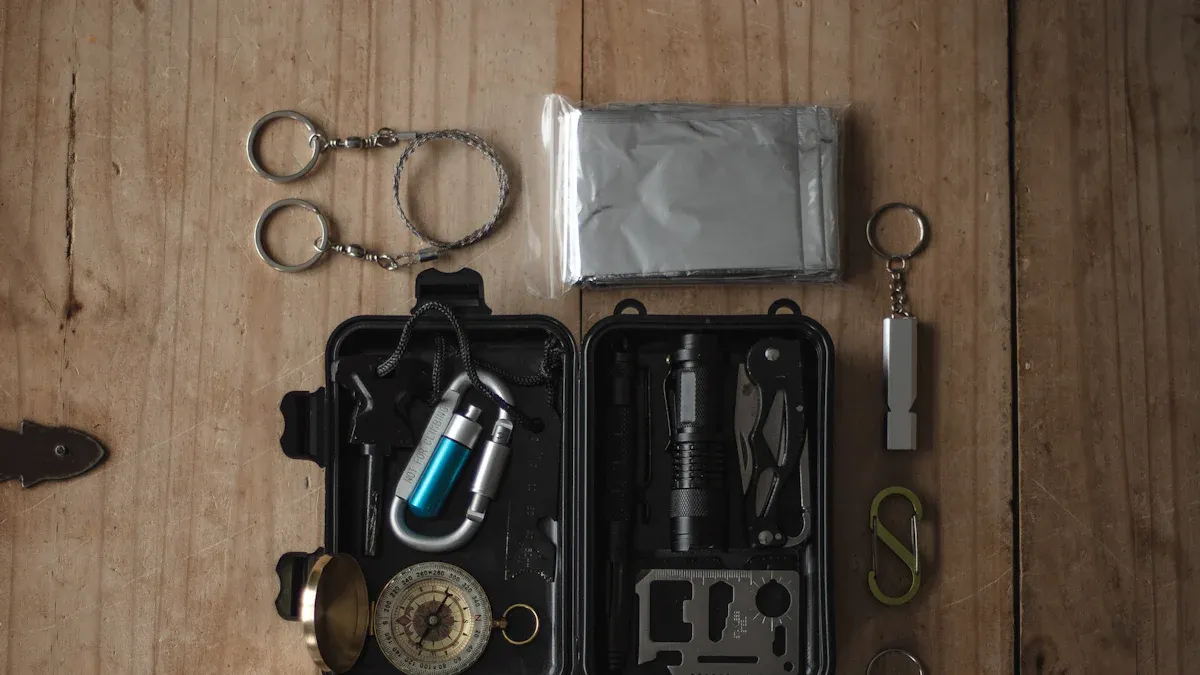The Essential Role of Flashlights in Emergency Preparedness for Daily Life

A flashlight is a reliable source of light that can make a difference during emergencies. Approximately 1 in 4 U.S. households experience power outages annually, leaving millions in the dark. The life-saving power of flashlights ensures critical illumination, helping you stay safe and secure. A reliable flashlight is essential for preparedness.
Key Takeaways
Flashlights give quick light when power goes out, helping you stay safe and move in the dark.
A good flashlight can send signals for help, helping rescuers find you faster.
Taking care of flashlights and storing them well makes them work better in emergencies.
The Importance of Flashlights in Emergencies

Providing Light During Power Outages
Power outages can strike unexpectedly, leaving you in complete darkness. Flashlights provide an immediate and reliable source of light, ensuring your safety and ability to navigate your surroundings. Compared to other emergency lighting tools, flashlights excel in brightness, runtime, durability, and versatility. Brightness, measured in lumens, determines how effectively a flashlight illuminates an area. A durable flashlight can withstand harsh conditions, making it a dependable tool during a disaster. In rural areas, where 35.4% of households experience power outages compared to 22.8% in urban areas, having a flashlight becomes even more critical.
Navigating Safely in Darkness
Darkness increases the risk of accidents, especially during a natural disaster. A flashlight helps you avoid obstacles, locate essential items, and guide others to safety. Whether you are evacuating your home or moving through unfamiliar terrain, a flashlight ensures you can see clearly and stay safe. Its portability allows you to carry it wherever you go, making it an indispensable tool for emergencies.
Signaling for Help in Critical Situations
Flashlights can save lives by signaling for help. In real-life emergencies, hikers have used flashlights to alert rescue teams, and a woman in Florida used her phone's light to signal a helicopter. These examples highlight the importance of flashlights in emergencies. A flashlight's beam can cut through darkness, making it easier for rescuers to locate you during a disaster.
Reducing Stress and Enhancing Security
Having a flashlight during emergencies provides psychological comfort. It reduces anxiety and fear, offering a sense of normalcy in stressful situations. For families, a flashlight can create a feeling of security, especially during a natural disaster. Knowing you have a reliable source of light can help you stay calm and focused when it matters most.
Features of the Best Emergency Flashlight

Optimal Brightness and Beam Distance
When choosing the best emergency flashlight, brightness and beam distance are critical factors. Brightness, measured in lumens, determines how well the flashlight illuminates your surroundings. A flashlight with adjustable brightness levels allows you to adapt to different situations. For example, a high-lumen setting is ideal for outdoor use, while a lower setting conserves power indoors. Beam distance is equally important. It measures how far the light reaches, which is essential for spotting hazards or signaling for help. A flashlight with a focused beam ensures you can see clearly, even in complete darkness.
Long Battery Life and Power Options
A flashlight with long battery life ensures reliability during emergencies. Rechargeable flashlights are an excellent choice for daily preparedness. They reduce waste and save money over time. Good quality lithium-ion batteries, such as 18650 or 21700, maintain their charge well and perform reliably. For extreme conditions, Energizer Ultimate Lithium batteries in AA or AAA sizes are ideal. They work in harsh temperatures and have a low risk of leakage. Primary lithium or CR123A batteries offer a long shelf life, while low self-discharge NiMH batteries, like Eneloops, are great secondary options. Always keep spare batteries on hand to ensure your flashlight remains functional.
Durable and Weather-Resistant Design
Emergencies often occur in unpredictable conditions. A durable flashlight withstands drops, impacts, and rough handling. Look for models made from high-quality materials like aluminum or reinforced plastic. Weather-resistant designs, such as those with an IPX4 or higher rating, protect against rain, snow, and dust. This ensures your flashlight performs reliably, even in challenging environments. A rugged design guarantees that your flashlight will last through multiple uses.
Compactness and Ease of Use
A compact flashlight is easy to carry and store. Lightweight designs fit comfortably in your pocket, bag, or emergency kit. Flashlights with simple controls, such as a single-button operation, are user-friendly and reduce confusion during stressful situations. Some models include features like a wrist strap or clip for added convenience. A flashlight that combines portability with ease of use ensures you can access light quickly when you need it most.
Practical Tips for Using Flashlights in Daily Preparedness
Storing Flashlights in Accessible Locations
You should always store flashlights in places where you can quickly find them during emergencies. Common locations include nightstands, kitchen drawers, and hall closets. Keep one by each door and in your car for added convenience. To protect your flashlight from moisture, store it in a waterproof bag. Use brand-new batteries and avoid turning the flashlight on unnecessarily to preserve power. Regularly inspect and clean your flashlight to ensure it remains functional.
Tip: Keep spare batteries nearby and check them every 6-12 months to ensure they work when needed.
Adding Flashlights to Emergency Kits
A flashlight is a vital part of any emergency preparedness kit. Include it alongside other essentials like a whistle, dust mask, and first aid supplies. A durable flashlight with long battery life is ideal for signaling in the dark. Store your kit in an easily accessible location, such as a hallway closet or your car. This ensures you can grab it quickly during an emergency.
Carrying a Portable Flashlight Daily
Carrying a portable flashlight every day enhances your preparedness. It provides light during unexpected power outages and improves visibility in dark environments. A compact flashlight fits easily in your pocket or bag, making it convenient for daily use. Tactical flashlights with strobe or SOS features can also improve personal safety.
Performing Regular Maintenance and Battery Checks
Proper maintenance keeps your flashlight reliable. Store it in a cool, dry place to avoid damage from extreme temperatures. Clean it regularly and lubricate threads and o-rings to maintain its watertight seal. Effective battery care, such as using high-quality lithium batteries, ensures your flashlight performs well when you need it most.
Flashlights play a vital role in ensuring safety and preparedness. Choosing the right flashlight involves evaluating key features:
Feature | Description |
|---|---|
Value | Cost vs. benefit analysis of flashlights. |
Brightness | Measured by lumen output; crucial for performance. |
Runtime | Duration the flashlight lasts when turned on; important for emergencies. |
Durability | Ability to withstand harsh conditions; essential for reliability. |
Versatility | Features that enhance usability in various situations. |
Incorporating flashlights into your daily routine enhances preparedness. They provide reliable lighting during emergencies, reduce stress, and improve safety. Rechargeable LED models also support sustainability. By choosing a durable and versatile flashlight, you ensure peace of mind in unpredictable situations.
Tip: Keep a flashlight accessible to navigate dark environments confidently.
FAQ
What type of flashlight is best for emergencies?
Choose a durable, weather-resistant flashlight with long battery life. A compact design and adjustable brightness levels make it versatile for various situations.
How often should you check your flashlight?
Inspect your flashlight every 6-12 months. Test its functionality, clean it, and replace batteries if needed to ensure it works during emergencies.
Can a flashlight be used for self-defense?
Yes, tactical flashlights with strobe features can disorient attackers. Their sturdy build also makes them effective for self-defense in critical situations.
See Also
Real-Life Advantages of Everyday Carry Flashlights
Why Hunting Flashlights Are Crucial for Outdoor Lovers
Essential LED Flashlights for Convenient Home Applications
Hand-Cranked Flashlights: Portable Tools for Emergency Situations
A Homeowner's Guide to Selecting the Ideal Emergency Flashlight
